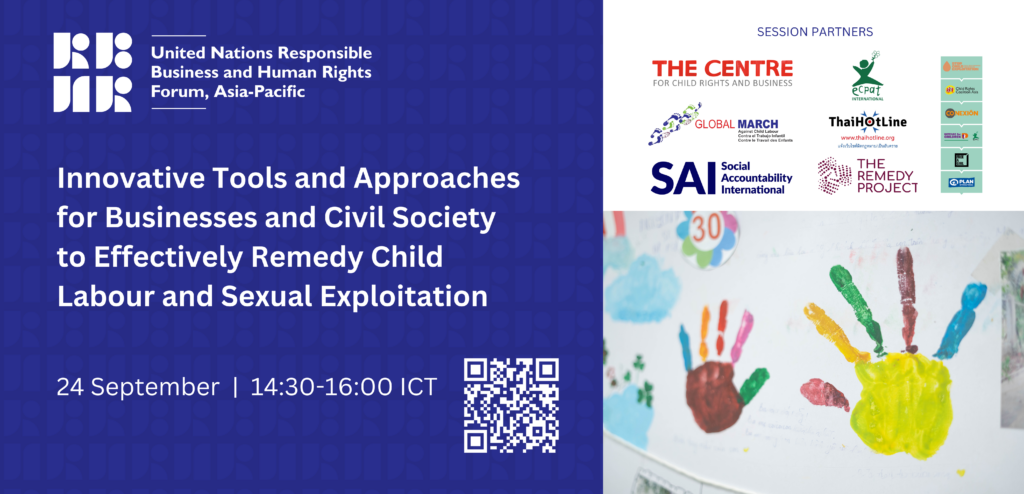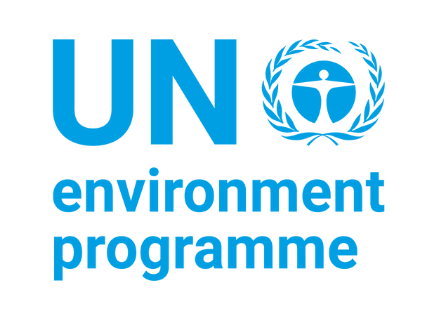
Join us at the 2024 UN Responsible Business and Human Rights (UN RBHR) Forum in Bangkok, Thailand on 24th September 2024 for a powerful side-session on tackling child labor and sexual exploitation.
Titled Innovative Tools and Approaches for Businesses and Civil Society to Effectively Remedy Child Labour and Sexual Exploitation, this joint session brings together seven organizations with expertise in child labor prevention and remediation, ending sexual exploitation and abuse of children, child rights, and human rights due diligence regulations. Together, we invite participants to discuss how businesses, governments, NGOs and trade unions can work together to implement holistic and scalable solutions, from programs and tools that align with Human Rights Due Diligence (HRDD) regulations to specialized support for victims, ensuring that all children have access to protection and remedy, no matter where the risks and abuse occurs.
BACKGROUND
Child labor remains a pervasive issue across industries, particularly in lower tiers of supply chains and informal work conditions in the Asia Pacific region. Additionally, growing risks to children extend beyond traditional supply chains, with the rise of digital platforms and technology facilitating new forms of exploitation, such as trafficking and sexual exploitation.
The reach and accessibility of traditional Organisational Grievance Mechanisms (OGMs) in lower tiers of supply chains are limited and not necessarily tailored to the needs of children. Coordinated, multi-stakeholder approaches are needed to dismantle the barriers that prevent child victims from accessing remedies that are in their best interests. In this context, community-based mechanisms, including practical on-the-ground programmes and Child Labour Monitoring Systems (CLMS) can play a crucial role in detecting and addressing child labour, offering a pathway to effective remedy.
This joint session brings together four organizations with expertise in child labor prevention and remediation, ending sexual exploitation and abuse of children, child rights, and human rights due diligence regulations. Together it invites participants to discuss how businesses, governments, NGOs and trade unions can work together to implement holistic and scalable solutions, from programs and tools that align with Human Rights Due Diligence (HRDD) regulations to specialized support for victims, ensuring that all children have access to protection and remedy, no matter where the risks and abuse occurs.
SPEAKERS
- Dr Srida Tantaatipanit, Executive Director, Thailand Hotline Foundation (representing the Down to Zero Alliance in collaboration with ECPAT International)
- Marco Dubelt, Senior Director, The Global March Against Child Labour
- Riri Siti O. Malikah, Director of Services – Asia, The Centre for Child Rights and Business (representing the MY Voice Initiative in collaboration with Social Accountability International)
- Archana Kotecha, Founder & CEO, The Remedy Project
Panel and Ignite Session moderator: Ines Kaempfer, CEO, The Centre for Child Rights and Business
WHAT YOU WILL LEARN
- The key challenges and opportunities in utilizing current grievance and child labor monitoring systems, and how can they be improved to ensure better access to remedy for vulnerable children.
- How the changing regulatory landscapes influences the effectiveness of child-centered approaches to remediation, and the actions needed to ensure these frameworks prioritize children’s best interests and create real impact.
- How community and sector-wide mechanisms can be scaled to address child labor and exploitation in supply chains. And existing opportunities for scaling innovations under new HRDD legislation.
- How partnerships between governments, businesses, NGOs and trade unions, SMEs and communities can be strengthened to enhance the implementation of existing programs and tools that address business-related child labor, sexual exploitation and trafficking.
FORMAT
The session will kick off with a mention poll and a 10-minute Ignite Session, offering fast-paced, visually engaging presentations will begin next to warm up the audience and set the context. This will be followed by a 60-minute Panel Discussion featuring expert insights on remedying child labour and sexual exploitation, with 10 minutes allocated for Q&A to address audience questions. The session will close with a participatory activity whereby attendees share feedback and insights on whiteboards. The session will close with a 10-minute presentation of each whiteboard and a brief summary of key takeaways.









